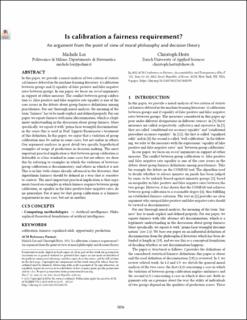Please use this identifier to cite or link to this item:
https://doi.org/10.21256/zhaw-27395| Publication type: | Conference paper |
| Type of review: | Peer review (publication) |
| Title: | Is calibration a fairness requirement? : an argument from the point of view of moral philosophy and decision theory |
| Authors: | Loi, Michele Heitz, Christoph |
| et. al: | No |
| DOI: | 10.1145/3531146.3533245 10.21256/zhaw-27395 |
| Proceedings: | Proceedings of the 2022 ACM Conference on Fairness, Accountability, and Transparency |
| Page(s): | 2026 |
| Pages to: | 2034 |
| Conference details: | 5th ACM Conference on Fairness, Accountability, and Transparency (FAccT), Seoul, Republic of Korea, 21-24 June 2022 |
| Issue Date: | 2022 |
| Publisher / Ed. Institution: | Association for Computing Machinery |
| ISBN: | 978-1-4503-9352-2 |
| Language: | English |
| Subjects: | Equalized odds; Fairness; Prediction; Calibration; Equal opportunity |
| Subject (DDC): | 006: Special computer methods |
| Abstract: | In this paper, we provide a moral analysis of two criteria of statistical fairness debated in the machine learning literature: 1) calibration between groups and 2) equality of false positive and false negative rates between groups. In our paper, we focus on moral arguments in support of either measure. The conflict between group calibration vs. false positive and false negative rate equality is one of the core issues in the debate about group fairness definitions among practitioners. For any thorough moral analysis, the meaning of the term “fairness” has to be made explicit and defined properly. For our paper, we equate fairness with (non-)discrimination, which is a legitimate understanding in the discussion about group fairness. More specifically, we equate it with “prima facie wrongful discrimination” in the sense this is used in Prof. Lippert-Rasmussen's treatment of this definition. In this paper, we argue that a violation of group calibration may be unfair in some cases, but not unfair in others. Our argument analyzes in great detail two specific hypothetical examples of usage of predictions in decision making. The most important practical implication is that between-group calibration is defensible as a bias standard in some cases but not others; we show this by referring to examples in which the violation of between-group calibration is discriminatory, and others in which it is not. This is in line with claims already advanced in the literature, that algorithmic fairness should be defined in a way that is sensitive to context. The most important practical implication is that arguments based on examples in which fairness requires between-group calibration, or equality in the false-positive/false-negative rates, do no generalize. For it may be that group calibration is a fairness requirement in one case, but not in another. |
| URI: | https://digitalcollection.zhaw.ch/handle/11475/27395 |
| Fulltext version: | Published version |
| License (according to publishing contract): | CC BY 4.0: Attribution 4.0 International |
| Departement: | School of Engineering |
| Organisational Unit: | Institute of Data Analysis and Process Design (IDP) |
| Published as part of the ZHAW project: | Socially acceptable AI and fairness trade-offs in predictive analytics |
| Appears in collections: | Publikationen School of Engineering |
Files in This Item:
| File | Description | Size | Format | |
|---|---|---|---|---|
| 2022_Loi-Heitz_Is-calibration-a-fairness-requirement.pdf | 314.82 kB | Adobe PDF |  View/Open |
Show full item record
Loi, M., & Heitz, C. (2022). Is calibration a fairness requirement? : an argument from the point of view of moral philosophy and decision theory [Conference paper]. Proceedings of the 2022 ACM Conference on Fairness, Accountability, and Transparency, 2026–2034. https://doi.org/10.1145/3531146.3533245
Loi, M. and Heitz, C. (2022) ‘Is calibration a fairness requirement? : an argument from the point of view of moral philosophy and decision theory’, in Proceedings of the 2022 ACM Conference on Fairness, Accountability, and Transparency. Association for Computing Machinery, pp. 2026–2034. Available at: https://doi.org/10.1145/3531146.3533245.
M. Loi and C. Heitz, “Is calibration a fairness requirement? : an argument from the point of view of moral philosophy and decision theory,” in Proceedings of the 2022 ACM Conference on Fairness, Accountability, and Transparency, 2022, pp. 2026–2034. doi: 10.1145/3531146.3533245.
LOI, Michele und Christoph HEITZ, 2022. Is calibration a fairness requirement? : an argument from the point of view of moral philosophy and decision theory. In: Proceedings of the 2022 ACM Conference on Fairness, Accountability, and Transparency. Conference paper. Association for Computing Machinery. 2022. S. 2026–2034. ISBN 978-1-4503-9352-2
Loi, Michele, and Christoph Heitz. 2022. “Is Calibration a Fairness Requirement? : An Argument from the Point of View of Moral Philosophy and Decision Theory.” Conference paper. In Proceedings of the 2022 ACM Conference on Fairness, Accountability, and Transparency, 2026–34. Association for Computing Machinery. https://doi.org/10.1145/3531146.3533245.
Loi, Michele, and Christoph Heitz. “Is Calibration a Fairness Requirement? : An Argument from the Point of View of Moral Philosophy and Decision Theory.” Proceedings of the 2022 ACM Conference on Fairness, Accountability, and Transparency, Association for Computing Machinery, 2022, pp. 2026–34, https://doi.org/10.1145/3531146.3533245.
Items in DSpace are protected by copyright, with all rights reserved, unless otherwise indicated.